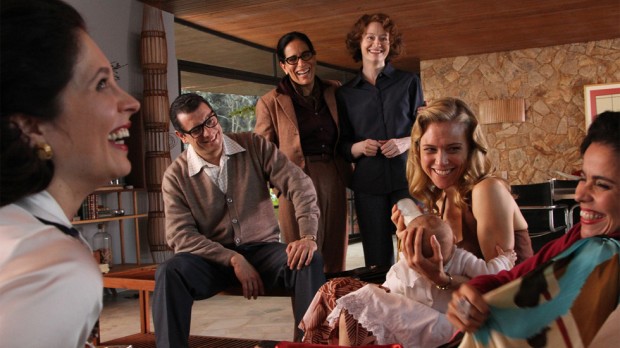Reaching for the Moon is a lush, erotic and mature drama chronicling several years (we’re uncertain how long, but it’s temporal disorientation is intentional) in the relationship of the American poet Elizabeth Bishop and the Brazilian architect Lota de Macedo Soares. Bishop is played is a complex and moving performance by Miranda Otto, with a strong, commanding performance by Gloria Pires as her lover. Bishop leaves New York City, seeking inspiration she visits her former college classmate Mary (Tracey Middendorf) for a few days in Rio, a city Bishop initially says reminds her of Mexico City crossed with Miami.

Otto is stunning as Bishop, who leaves New York, suggesting a little loss every day is important for the soul. Feeling alien from a young age (growing up as orphan) she falls sick in Rio, extending her visit. We learn Mary and Elizabeth had been attracted to each other and the words did not exist for them to confirm suspicions, so they continued without the vocabulary for sexual liberation. It is only in Rio she comes into her own, seduced by Lota, who bulldozes a mountain to build her the proper studio she never had in New York.
Bishop finds herself interjecting in an established relationship, with different objectives than her friend Mary. Bishop becomes an “aunt” to Mary’s adopted child (Lota agrees to an adoption to keep her two lovers happy, and more importantly on site). Bishop finds success and ultimately pain — she goes from a lightweight casual drinker to an alcoholic in the second and third acts, returning to New York as a coup d’état forces change in Brazil. This frustrates Lota with her boundless ambitious as she constructs the once endangered (now a World Heritage Site) Flamingo Park. In New York, Bishop finds herself at a loss — she teaches, but sadly cannot seem to find happiness, which for her, always seems within reach, but never fully grasped.

The script (by Matthew Chapman and Julie Sayres) is imperfect, lacking subtly in its dialogue, however Bruno Barreto’s direction, including his use of music, atmosphere and the absolutely gorgeous compositions from cinematographer Mauro Pinheiro Jr., are intoxicating, elevating what may have been a straight forward psychological drama into realm of fairy tale. Barreto handles the complex dramatic material often with the light touch of his comedies Basa Nova and View from the Top — here he’s doing what he does best. Reaching for the Moon is a gorgeous, intoxicatingly beautiful drama, with strong performances from our leads.

